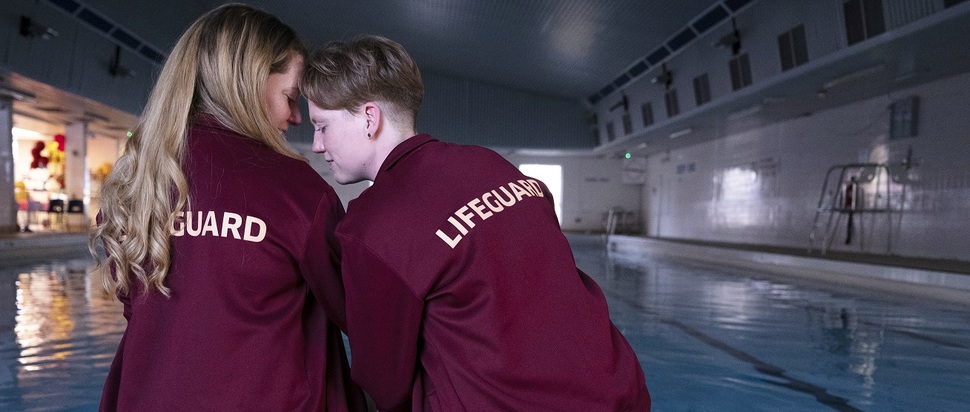Stef Smith on LGBTQ+ micro-drama Float
We speak to acclaimed playwright Stef Smith about her first TV show, Float – an innovative, heartfelt and mint fresh micro-drama centred on a tender lesbian romance
Stef Smith has been a big deal in UK theatre for over a decade now. Her debut play, Roadkill, premiered at the 2010 Edinburgh Fringe, picking up a mess of awards, including a Fringe First Award, an Olivier Award and the Amnesty Award for Freedom of Expression. It put her on the map instantly and gave a taste of the work to come, which would be characterised by raw emotions, explosive subject matter and inventive use of form.
The reason Smith is being profiled in the Film & TV section – if you’re wondering – is that she’s just made her first foray into screenwriting with six-part BBC drama Float. On the surface, it’s a rather gentler prospect than her stage work. It’s a tender lesbian romance set in and around a small-town swimming pool, and centres on Jade, a spiky young woman who’s returned to her coastal hometown after mysteriously dropping out of uni in Glasgow. While slumming it as a lifeguard, a romantic relationship blossoms between Jade and her seemingly straight colleague Collette.
Like Float’s protagonist, Smith also grew up gay in smalltown Scotland, specifically Aberfoyle, but she’s quick to point out the show is not autobiographical. Smith did have her 18-year-old self in mind while writing, however. “I am very aware that where I grew up is sorely underrepresented on screen,” she says. “And definitely, it's sorely represented through the eyes of the LGBTQ+ community. As a gay woman, I certainly saw no one like me on screen, so I wanted Float to be an offering and a gesture towards the importance of telling LGBTQ+ stories, but also telling stories from Scotland that are outside of the urban centres as well.”
Where Float does chime with the daring of Smith’s stage work is in its form. Eschewing the typical hour or half-hour episode structure, each instalment comes in at a tight ten minutes. But this innovative, micro-drama format proved tricky. “You would think, ‘It's less content so it must be easier,’” suggests Smith. “But actually it’s quite the opposite because you've got to be so concise with your storytelling. The technical aspect of what it means to tell a story in ten minutes is daunting. It both has to have closure within those ten minutes, but also enough of a hook to lead you into the next episode.”
What made Float even more of a challenge is that around Jade and Collette is an ensemble cast with their own little dramas and romantic imbroglios. “We had to make sure that each of those characters had depth and there was more to them than simply just being plot devices to help facilitate the main story,” she explains. “So it was a challenge. The first drafts of all the episodes were too long, so it became a matter of editing and redrafting as much as anything else.”
Smith’s background in theatre did help in this regard, though. “I've done a lot of short plays over the years, sort of rapid response pieces, so I was sort of aware of ten minutes being quite a difficult time to write a complete story in. And I think more generally, coming from a theatre background, you're used to writing for smaller casts, and also for singular spaces, so I didn't feel the lack of being able to write big setpieces or anything like that.”
While LGBTQ+ stories on the small screen are still incredibly rare – particularly in Scotland – they are not without their clichés. It’s something Smith, and the production team in general, were wary of. “We definitely wanted to step away from that very shiny, American version of being a lesbian or queer woman that you get in series like The L Word," she says. "We wanted to give it a bit more grit and to ground it more in the reality of young people's lives at the moment.”
There was another massive cliché of queer cinema that Smith was keen to avoid: tragedy. “I felt a lot of responsibility when portraying Jade and Collette on-screen. It’s obviously a real trope of LGBTQ+ fiction in general, but specifically for gay and queer women, their stories often end badly. And so while Float doesn't exactly give them a Hollywood happy ending, it does at least give them hope. At the end, I wanted you to feel these characters will go on and thrive.”
Float began life as a pitch to the BBC Writersroom Scotland as part of a programme to develop and commission content for young underrepresented audiences in Scotland. The scheme paired TV greenhorn Smith with established Scottish production house Black Camel to develop the drama. Smith clearly enjoyed the collaboration and suggests the success is down to Black Camel taking the project seriously. “I thought Black Camel were an amazing team and they really treated this as they would any production,” she says. “There wasn't any sense that because it was smaller, or for a younger audience, that it was somehow lesser; not at all. They really gave it respect and also resources... they gave it their all basically.”
Float is streaming now on the BBC iPlayer
